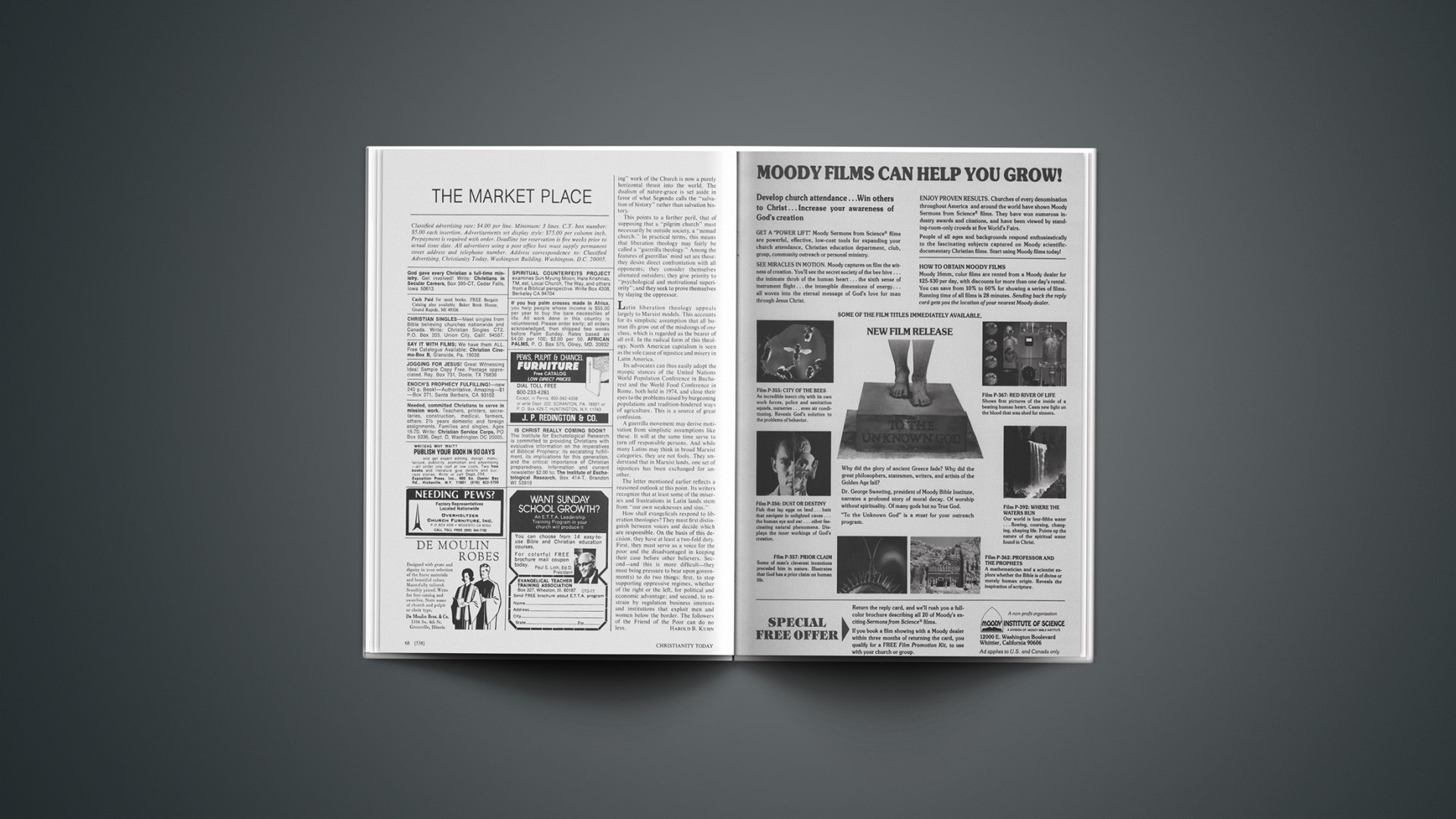The voices of those locked in hopeless poverty in Latin America should ring in the ears of Christians north of the border. The miseries there are, whether we recognize it or not, burdens upon our consciences.
Before the presidential election last November the National Council of Churches publicized “An Open Letter to North American Christians.” Taken at face value, the letter is something that no sensitive evangelical can read without conviction and sadness. While ignoring the denials of civil rights and distortions of justice by the present government of Cuba and the fact that Cuba is locked into an exploitative system, the document is moderate in tone and speaks eloquently for the voiceless.
Regrettably, voices like these tend to be drowned out by the strident tones of the advocates of liberation theology. This theology has been patterned after such models as black and feminist liberation. It represents one possible response of concerned Latins to oppressive economic and political situations that seem totally unresponsive to peaceable attempts at change.
Advocates of such a theology face serious perils—or at least serious temptations—that we need to take into account as we hear them.
One peril that shows through the literature of liberation theology is an uncritical use of biblical models. The major model currently in use is that of the Exodus. Rather too easily, in my opinion, Latin American theologians assume that today’s oppressed people are the heirs of God’s Exodus—that they are the present-day counterparts of the Israelitish people in Egypt.
Seldom are all facets of the Exodus account considered. For instance, Moses’ abortive use of violence as a means of deliverance, with its forty-year cooling-off period, is seldom mentioned. Nor is it observed that the Exodus was Jehovah’s deliverance, not a seizure of power by an underground movement.
Attempts to domesticate God have not been particularly successful in the past, and there is little reason to suppose that this current form will be any more effective. It is precisely this form of idolatry that emerges as any group assumes for itself a “people of God” role.
It is disturbing that liberation theologians do not give more attention to building a set of common values and adequate symbols among their peoples. Without these, any liberation by violence will probably lead only to a change of oppressors. Mere oppression neither makes any people to be “the people of God” nor guarantees that a victory by force will produce lasting liberation.
A second peril grows out of the first. Some liberation theologians suggest that the Exodus is a model by which all oppressed peoples, regardless of their circumstances, can understand their plight and find deliverance from their miseries. It may be questioned whether the Bible can be used indiscriminately to justify all political and economic struggles.
A third peril lies hidden in the rationale advanced for this position. Hugo Assmann, who with Gustavo Gutiérrez and Juan Luis Segundo may be regarded as a spokesman for Latin liberation theology, highlights this aspect of the problem. In his Theology For a Nomad Church, Assmann makes clear the movement’s assumption that the purely “salvationist” understanding of the Christian mission has been rendered obsolete by what Gutiérrez calls “the unvarnished affirmation of the possibility of universal salvation.”
By this historicizing (or relativizing) of the Scriptures, the liberation theologians think they have effectively disposed of the historic understanding of the Great Commission. They suggest that the “liberating” work of the Church is now a purely horizontal thrust into the world. The dualism of nature-grace is set aside in favor of what Segundo calls the “salvation of history” rather than salvation history.
This points to a further peril, that of supposing that a “pilgrim church” must necessarily be outside society, a “nomad church.” In practical terms, this means that liberation theology may fairly be called a “guerrilla theology.” Among the features of guerrillas’ mind set are these: they desire direct confrontation with all opponents; they consider themselves alienated outsiders; they give priority to “psychological and motivational superiority”; and they seek to prove themselves by slaying the oppressor.
Latin liberation theology appeals largely to Marxist models. This accounts for its simplistic assumption that all human ills grow out of the misdoings of one class, which is regarded as the bearer of all evil. In the radical form of this theology, North American capitalism is seen as the sole cause of injustice and misery in Latin America.
Its advocates can thus easily adopt the myopic stances of the United Nations World Population Conference in Bucharest and the World Food Conference in Rome, both held in 1974, and close their eyes to the problems raised by burgeoning populations and tradition-hindered ways of agriculture. This is a source of great confusion.
A guerrilla movement may derive motivation from simplistic assumptions like these. It will at the same time serve to turn off responsible persons. And while many Latins may think in broad Marxist categories, they are not fools. They understand that in Marxist lands, one set of injustices has been exchanged for another.
The letter mentioned earlier reflects a reasoned outlook at this point. Its writers recognize that at least some of the miseries and frustrations in Latin lands stem from “our own weaknesses and sins.”
How shall evangelicals respond to liberation theologies? They must first distinguish between voices and decide which are responsible. On the basis of this decision, they have at least a two-fold duty. First, they must serve as a voice for the poor and the disadvantaged in keeping their case before other believers. Second—and this is more difficult—they must bring pressure to bear upon government(s) to do two things: first, to stop supporting oppressive regimes, whether of the right or the left, for political and economic advantage; and second, to restrain by regulation business interests and institutions that exploit men and women below the border. The followers of the Friend of the Poor can do no less.










